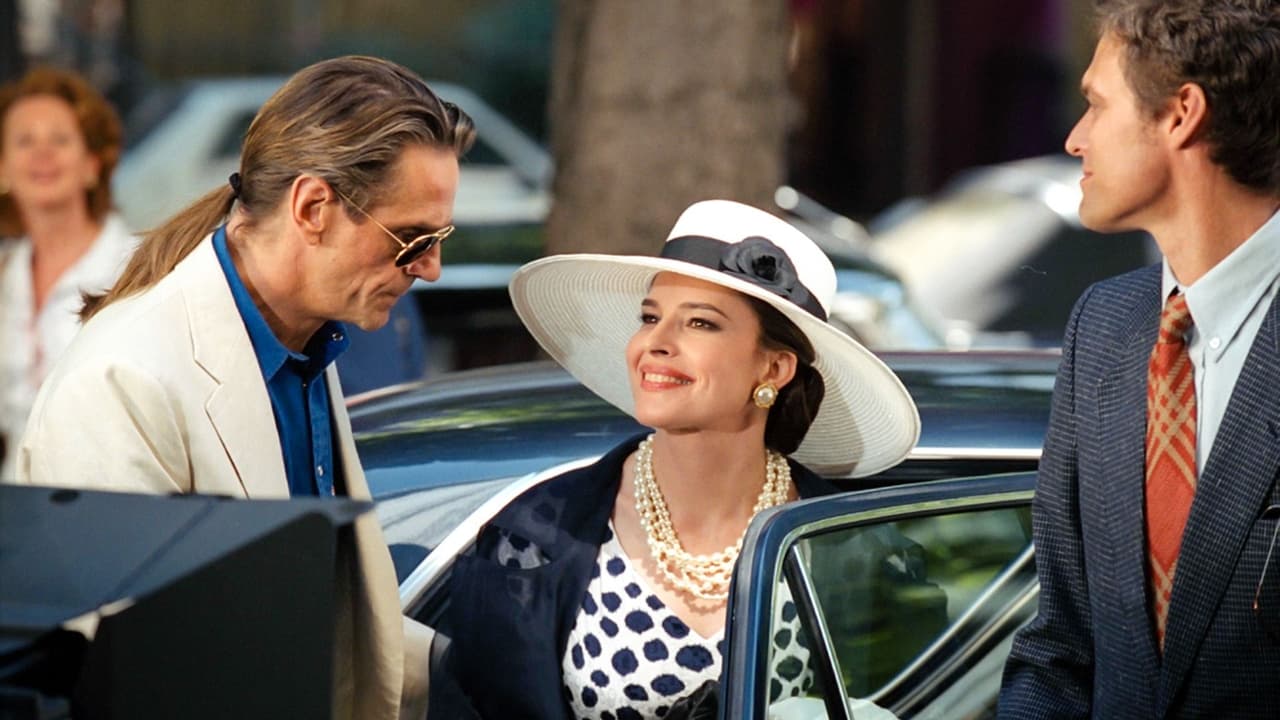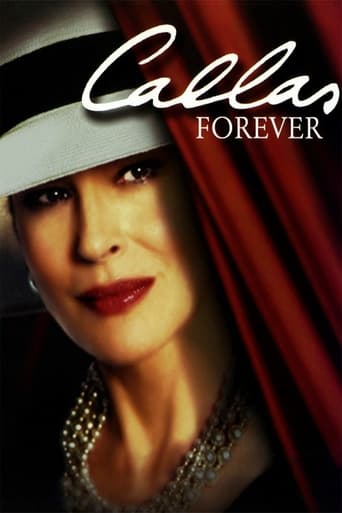

I don't think they got this right, and it's a bizarre project to boot. It's a highly fictionalized tale of the great opera singer in her waning days, in which she attempts to revive her image by agreeing to star in a film production of Carmen. What was the point?It seems this: on one hand a portrait of the passionate, hysteric woman, Fanny Ardent is truly spot on as the tempestuous Callas. More deeply, Zeffirelli who had known and worked with her on the stage, structures his film around the public image of the late Callas—the Parisian recluse lost in herself and past glories—to give us a sort of introspective insight of a damaged soul.So a kind of Sunset Blvd.It all fits together in a way. Callas' voice in the film is her own, and when all is said and done, that voice was what made Callas who she was, the only thing that was uniquely hers. And yet, the obsessive woman bent everything to match the image she thought she had to be on that stage, which may have contributed to her singing decline.So in the film, we have Callas' marvellous voice, a faithful image of her in Ardent as Callas past her prime making a film to revive a past image she had created, which she eventually rejects as false. And the film is based one can presume, on liberally fabricated memories of an associate.Everything else in the film reflects that business with the creation of illusion—the Japanese failure, her visitation by personal ghosts and passionate lip-synching to old records, the fictionalized Carmen film where she must dub herself using old recordings, an effort she insists is fake, an illusion.It's a heady film, but it doesn't work. You could make a great film on the subject, in fact it is what Mulholland Dr. is all about. But not about Callas, who was a sincerely melodramatic being, which means showing her as she was, you get a histrionic character like the ones she played. And apparently, not by Zeffirelli's hands.This fits together as an operatic artifact of fabricated memories, but at the expense of the more subtle introspective capacity of cinema.
... View MoreFanny Ardant plays the great diva Maria Callas in "Callas Forever," a 2002 film directed and co-written by her friend, Franco Zeffirelli. In the film, the "Zeffirelli" character, Larry Kelly (Jeremy Irons) has an idea for adding to Callas' body of work. He wants to film her in the various opera roles she played, only instead of using her present voice, which seems ruined, he will dub her with her old recordings. The first opera is to be "Carmen." Now to convince Callas, who has isolated herself in her apartment since a disastrous concert tour and the death of Aristotle Onassis and will see no one. But Larry persists and finally gets her to agree.This is not a biography or a character study but more a fantasy - the first fantasy being that Callas would have admitted anyone into her apartment in the first place. "Callas Forever" is more a "what might have been" if, at the end of her life, Callas had been able to come out of herself and explore her great artistry once again. The movie is beautifully produced and filled with Callas' most glorious singing, as well as a re-enactment of the scene where Tosca kills Scarpia in "Tosca." Fanny Ardant does a fantastic job as Callas. Her features are softer, but she has the mannerisms, the personality and the clothes that would make anyone who just saw a photo of her realize she was playing Callas. Ardant plays her as the sad, still temperamental diva who, completely alone, is asking herself what her life was all about, and were any of her goals worth it. She is a woman who felt, in fact, older than her years as she grieved for the man he loved and his betrayal of her.Though the story Zeffirelli tells is not a true one, some of the emotions are certainly correct. Callas was completely devastated when Onassis left her - and he left her with nothing, not even friendship. Having the emotional maturity of a 12-year old due to her mother favoring her sister, growing up fat, etc., she allowed Aristotle to call all the shots and use her, breaking her both emotionally and spiritually. When he realized he had made a mistake by marrying Jackie, he came back to Maria - and she took him back. (They used to call Jackie "the widow.") She once poured out her heart to writer John Ardoin on tape, and it is probably the most pathetic transcript ever. To compensate, she tried to sing again, but she'd lost both her nerve and her voice. It's doubtful that her voice was gone. Callas had always had vocal problems, and as singers age, they lose some of their top notes. If she had been able to trust someone to realign her voice, she could have done well in a different repertoire such as Carmen and Eboli, even if she had just recorded them.Maria Callas was a beautiful, gifted woman who thought that a career would give her the love she never received as a child - and it didn't. If you've ever seen the photo of her taking her bow as Norma and looking over at Aristotle in the box, she's absolutely radiant, she's on top of the world. She's in love and enjoying her life for the first time. It breaks your heart because that time in her life, like "Callas Forever," was only a fantasy.
... View MoreThis is an odd movie, fairly opulent looking, yet barely released. A gay rock music promoter named Larry Kelly (I wonder if the REAL Larry Kelly, who started the Dallas Opera and worked with Callas, is still alive) is also a friend of recluse Maria Callas. He talks Callas into starring in a movie of Carmen, using her 13 year old recording as a soundtrack. She is difficult, but superb. The Carmen movie is a big success, but Maria feels uncomfortable with the concept and asks Larry to withdraw the film.Fanny Ardant is pretty good, but too variable. She swings from crotchety to alluring in a matter of seconds. You don't see much behind that beautiful mask. Anne Bancroft or Audrey Hepburn might have been better if the project had been done earlier and written better... Jeremy Irons is wince inducing: it is always unpleasant to watch an actor trying to make something out of nothing - the character of Larry is simply one-dimensional. Joan Plowright brings commonsense - a rare commodity in this film - to her few scenes.A few moments linger: Ardant, as Callas-Carmen, smoking a thin cigar before throwing her flower at José. Callas starting to seduce a hunky tenor, but thinking better of it after a little kiss.It is all very bizarre: outrageous Chanel product placement, saccharine gay subplot ( awww, the young boyfriend got a hearing aid so that he could hear Callas LPs), hideous punk rock music under the credits... and as others have remarked, the characters live in 1977, but the look is 2000.Basically yet another example of Zeffirellian effects without causes.
... View MoreMaria Callas was an artist of such magnitude that it seems impossible for any filmed biography to do her justice. Besides, who could really play Maria Callas? Well, the actress featured here does as well as anyone else could, which is, I guess, adequate. Of much greater importance is the banality of the story. I can't imagine Maria Callas in the 1970's even considering doing what the film suggests. By 1965, it was painfully obvious that Callas, despite her glamorous image and appearance, could never, even at age 41, have reconstructed her once fabulous voice, a voice which in its prime could accomplish miracles. In any case, it is folly to suggest that Callas would have elected to do a film version of "Carmen" ( a role she never cared for) with a dubbed recording she had made years earlier. I could see "Norma", "Tosca" or "Traviata", but never "Carmen". Larry Kelly actually died several years before Callas, so his presence here is pure fiction ------- which is what the film actually is. As a way to pass 108 minutes, the film is adequate, but if you're looking for a documentation of Maria Callas in her final years, you will have to keep looking. I doubt whether you will ever find what you are looking for because it seems highly unlikely that the real Callas, ever the elusive firefly, will ever be captured and preserved.
... View More